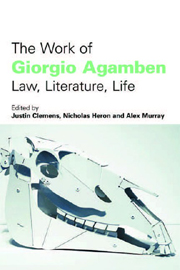Book contents
- Frontmatter
- Contents
- Acknowledgements
- Notes on Contributors
- The Enigma of Giorgio Agamben
- 1 K
- 2 Integral Actuality: On Giorgio Agamben's Idea of Prose
- 3 The Role of the Shifter and the Problem of Reference in Giorgio Agamben
- 4 ‘Its Silent Working was a Delusion’
- 5 Politics and Poetics of Divine Violence: On a Figure in Giorgio Agamben and Walter Benjamin
- 6 Idea of Poetry, Idea of Prose
- 7 The Fading Memory of Homo non Sacer
- 8 Soulblind, or On Profanation
- 9 Face to Face with Agamben; or, the Other in Love
- 10 Beyond Spectacle and the Image: the Poetics of Guy Debord and Agamben
- 11 Dismantling Theatricality: Aesthetics of Bare Life
- 12 Notes on Media and Biopolitics: ‘Notes on Gesture’
- Index
3 - The Role of the Shifter and the Problem of Reference in Giorgio Agamben
Published online by Cambridge University Press: 12 September 2012
- Frontmatter
- Contents
- Acknowledgements
- Notes on Contributors
- The Enigma of Giorgio Agamben
- 1 K
- 2 Integral Actuality: On Giorgio Agamben's Idea of Prose
- 3 The Role of the Shifter and the Problem of Reference in Giorgio Agamben
- 4 ‘Its Silent Working was a Delusion’
- 5 Politics and Poetics of Divine Violence: On a Figure in Giorgio Agamben and Walter Benjamin
- 6 Idea of Poetry, Idea of Prose
- 7 The Fading Memory of Homo non Sacer
- 8 Soulblind, or On Profanation
- 9 Face to Face with Agamben; or, the Other in Love
- 10 Beyond Spectacle and the Image: the Poetics of Guy Debord and Agamben
- 11 Dismantling Theatricality: Aesthetics of Bare Life
- 12 Notes on Media and Biopolitics: ‘Notes on Gesture’
- Index
Summary
There is no there there.
Gertrude SteinPREAMBLE
If language constitutes the philosophical problem for Giorgio Agamben, it's not just any part of language that obsesses him. It is, rather, a peculiar kind of word, which twentieth-century linguistics denominated the ‘shifter’. It is even possible to say that, for Agamben, ‘in the beginning was the shifter’. In demonstrating this here, I deploy a number of words beginning with the letter ‘p’. These include: paradigm, parable, parataxis, paleonymy, potentiality, philology, prose and poeisis. These are directed against other p-words, such as ‘phatic’ and ‘performativity’. (This is admittedly kind of cheesy, but possibly mnemonically providential.) Above all, to miss the centrality of poetry in Agamben's thought is to misunderstand every salient detail of his work. As soon as ‘the question’ of ‘the political’ arises, everyone starts slavering over this signifier, and its crucial nexus with poetry is missed. Yet, as Agamben himself declares, ‘The question is not so much whether poetry has any bearing on politics, but whether politics remains equal to its original cohesion with poetry.’ It is the evidence, logic and consequences of this declaration that I explore here.
THE DOCTRINE
Agamben remains within the ‘linguistic turn’ effected in and by twentieth-century philosophy and, before that, by the great Romantic writers. Being what Anglo-Saxons like to call a ‘continental philosopher’, however, it is not simply a logico-grammatical analysis of propositions to which Agamben turns in order to establish truth-conditions, to demarcate sense from nonsense, meaningful propositions from the meaningless, logic from the illogical, science from art.
- Type
- Chapter
- Information
- The Work of Giorgio AgambenLaw Literature Life, pp. 43 - 65Publisher: Edinburgh University PressPrint publication year: 2008



